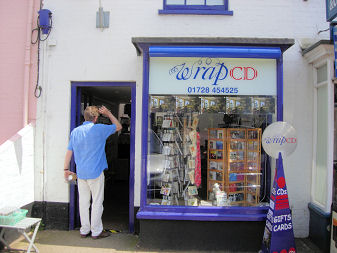Aldeburgh Festival (1) Britten,
Shostakovitch: The
Hallé, Mark Elder (conductor), Timothy Robinson
(tenor), Richard Watkin (horn) The Maltings, Snape, 10.06.2006
(AO)

Evidence that establishing
an audience for classical music sustains small, independent
enterprise. Picture published with permission.
Britten and Shostakovich enjoyed a mutually
inspiring personal relationship, which bore fruit in their
music. The first concert at Snape in this year’s
Aldeburgh Festival paid tribute to both composers with
two of their best known works, Britten’s Serenade
for Tenor, Horn and Strings, and Shostakovich’s
First Symphony. But at Aldeburgh, there’s always
a musical challenge. Britten founded the Festival to provide
an atmosphere in which the finest musicians could feel
stimulated creatively and with another composer, Thomas
Adès, as Artistic Director, the dynamism lives
on. In a stroke of imaginative programming, the two famous
pieces were set beside two rarities, Britten’s fragments
In memoriam Dennis Brain, and extracts from Shostakovich’s
ballet The Golden Age.
The Golden Age is a ballet about a heroic Soviet
football team venturing into the decadent capitalist West,
a xenophobic propaganda piece boosting Stalinist ambition.
Programming it to kick off the Aldeburgh Festival, on
the same day as the start of the World Cup, is a masterstroke
of sheer genius! Furthermore, this performance at Aldeburgh
is the first of many this summer – it scoops even
its birthplace, the Mariinsky Theatre in St Petersburg,
where the première of the full ballet production
will be presented on June 28th. Gergiev will be bringing
that production to the ENO in London in July, and the
concert version will be performed at the Proms. Modestly,
the Aldeburgh programme book mentions nothing of these,
but the Festival has scored, indeed.
Although serving a public political purpose, the piece
had personal meaning for Shostakovich as well. The composer
was 23 years old at the time, and a fanatical football
supporter. Moreover, he had himself just returned from
his first visit to the west, to Weimar, the symbol of
corrupt capitalist modernism. Shostakovich was fascinated
by jazz, modern dance, agitprop cabaret, indeed the whole
creative, chaotic buzz of 1920’s Germany –
so very different from the repression and regimentation
in soviet Russia. In writing this ballet, Shostakovich
could indulge his new found musical discoveries, while
ostensibly mocking them to please the Stalinist censors.
He later transcribed passages for piano which could be
enjoyed in relative privacy. That is perhaps why the music
still rings true with a sense of enthusiastic commitment.
A rapid succession of tableaux unfolds – a waltz,
a polka, a tango, jerky, angular rhythms that evoke the
spirit of social subversion that the “jazz age”
represented, even in the decadent west. Shostakovich employs
what were in 1920’s Russia, daring, “modern”
instruments, like the xylophone, woodblocks, and something
known as a “flexitone”. Music critics at the
time hated it, though the audience relished its freedom
of expression. To our ears it’s a lively, irreverent
romp that makes us remember just how revolutionary “modern”
music was then. Orchestras in Shostakovich’s time
would have found the material unfamiliar, but the Hallé,
well versed in the music of the last 80 years, appreciated
it for what it was. At moments, it felt like Lulu,
transformed with laughter.
It was an effort to adjust to the altogether different
mood of the Serenade for Tenor, Horn and Strings.
Moreover, there have been so many truly exceptional performances
of this piece that it would be perhaps expecting too much
of Robinson to supplant them. For a change, one focussed
on the lushness of the strings, eerily pure and menacing
at the same time. The Hallé musicians played with
exquisite clarity, and it was a joy to hear how the strings
and horn interacted around the voice. Watkin was impressive,
the nostalgic, other worldly quality of his music particularly
vivid in the pianissimo passages. Appropriately, there
were quotations from the part in Britten’s fragment
In Memoriam Denis Brain, for four horns and strings,
edited by Colin Matthews. It’s hard to guess what
the piece might have been like had Britten completed it,
for all we have are sketches for an introduction and part
of an allegro. There was nothing specially distinctive
to spur the composer along, however much he admired Brain.
Returning to Shostakovich reinvigorated the evening. Hearing
his First Symphony after the slightly later Golden
Age demonstrated how far the composer had progressed
in four short years. The Golden Age shows panache
in the way he handles ideas, while the First Symphony
seems more tentative and straightforward. Admittedly,
I’m one of the few people who doesn’t like
this symphony. But Elder and the Hallé presented
it briskly and full of vigour, downplaying the more Disneyesque
aspects. It was written by a teenager, after all, and
benefits from a performance which emphasises its youthful
high spirits and “see what I can do” cheekiness.
And therein lies another advantage that the Aldeburgh
Festival provides : the chance for London based audiences
to hear a non-London based top flight orchestra. It’s
such a pleasure to sense subliminal regional nuances.
Of course we have the spectacular BBC Proms to bring the
country, and indeed the world, together every summer.
But Aldeburgh does the same, on a more low key scale.
We are incredibly lucky that communal music festivals
like these keep classical music in the public consciousness,
encouraging and developing audiences. May we never take
for granted that there are people willing to dedicate
themselves to making events like this come to fruit.
Anne Ozorio



